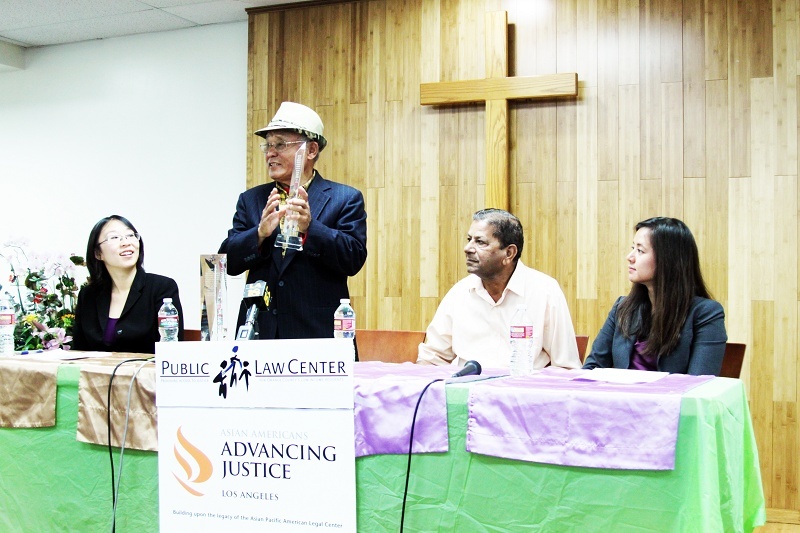

(From right to left: Nicole Ochi, Yong Woom Wang, Yabesh Malaviya, Lili Graham) Yong Woom Wang, one of the tenants of Miracle Terrace, presented gifts to Nicole Ochi and Lili Graham, attorneys from Asian Americans Advancing Justice and Public Law Center respectively, for their help in enabling Miracle Terrace residents to remain in their apartments with affordable rent.
There are millions of individuals and families struggling with low-income in the U.S., and a majority of those are of ethnic minority groups, according to the Public Research Bureau. Looking for affordable housing, especially for those who are not fluent in English, may seem an overwhelming challenge. However, when a team in the community works together to advocate for the housing needs of individuals with low-income, change can happen. With the united effort of residents, attorneys, and a church, up to 200 elderly, monolingual Korean tenants were saved from near homelessness this holiday season.
Miracle Terrace, an apartment complex in Anaheim, CA, was originally built as a non-profit to house low-income senior tenants. For years, the complex received a federally-subsidized mortgage through a U.S. Department of Housing and Urban Development (HUD) program provided under Section 236 of the National Housing Act that allowed residents to live in the apartment with an affordable rent. But in November of 2013, the mortgage expired, and the complex was passed over to a new owner.
The owner then decided to spike up the rent 75 to 80 percent, which cost 75 percent or more of the income of the residents. The severe increases forced the residents--many who live off of an income of less than $1,000 per month--to resort to budgeting only $15 to $50 for food per month, and to cut down on necessary medication.
But moving out wasn't an option for most residents either.
"I wasn't sure what I was supposed to do because my body is too weak for me to even move around comfortably, let alone move to a completely new place," shared Song Ae Lavin, 80, a tenant of Miracle Terrace.
Once the rent increases began, the residents were desperate. They reached out to several law firms and organizations, none of whom offered help and said the situation was hopeless. Finally, in March, the tenants contacted attorneys Nicole Ochi from Asian Americans Advancing Justice, and Lili Graham from Public Law Center, both who decided to take up their case.
The two attorneys initially found there was nowhere else for these tenants to go, even if they were to move. All of the other affordable housing options would require them to get through a wait list that would take anywhere from five to ten years.
They decided that the only available option for these residents was to apply for a different, project-based HUD program called Tenant-Protection Vouchers for Certain At-Risk Households in Low-Vacancy Areas, also known as low-vacancy rate vouchers. With these vouchers, the housing units would be subsidized by the government, and the tenants would only have to pay 30 percent of their income for the rent. The process, however, requires the owner of the housing complex to request for the program. Each individual tenant also needed to confirm that they qualify for the program, which was also an arduous process that usually takes 90 days.
In order to seize this only option, the residents, attorneys, and others combined their efforts. Together with the attorneys, the residents met regularly on a monthly or bi-monthly basis at Hanmin Kamsa Church, the facilities which Reverend Myung-Ku Shim opened to them, and at the Miracle Terrace complex, during which they all helped each other to fill out required applications and forms. When certain neighbors were in a shortage of food, other neighbors with a surplus gladly shared with them. During the months during which the residents were waiting for the low-vacancy rate vouchers to be approved, the attorneys helped find rental assistance for the time being. The office of Congresswoman Loretta Sanchez (CA-46th District) also helped advocate for their cause.
And all of their combined effort and advocacy allowed Miracle Terrace to obtain 124 vouchers from HUD right before Thanksgiving in just four and a half months, when the process usually takes a year or more. The low-vacancy rate vouchers now not only provide affordable rent for the residents, but because the vouchers are tied to each unit of the Miracle Terrace apartments, any new tenants who may move into those units are also eligible for affordable housing.
"This is truly a miracle from God," shared Lavin.
"Without the effort of even one or two people, none of this would have happened," Yong Woom Wang, a 74-year-old tenant, said. "We were able to do this because we all worked together and we all had one heart."
Though this was a miracle for Miracle Terrace residents, attorneys Ochi and Graham said that this shouldn't stop here. They encouraged the community to continue to advocate for more tenant protection.
"These aren't the only tenants who are in need of affordable housing," Graham shared. She added that everyone in each community must be proactive in communicating with non-profit legal organizations, congressmen and women, and especially the owners of homes and complexes.
"We're grateful to everyone who helped make this voucher happen because housing protections like this one at Miracle Terrace can protect some of our most vulnerable community members," she added.
"As more and more affordable housing complex mortgages financed under this [Section 236] program mature, low-income families across the country will face similar challenges to staying in their homes. We hope this case will encourage other similarly situated low-income tenants to advocate with HUD for these vouchers earlier in the process."


















